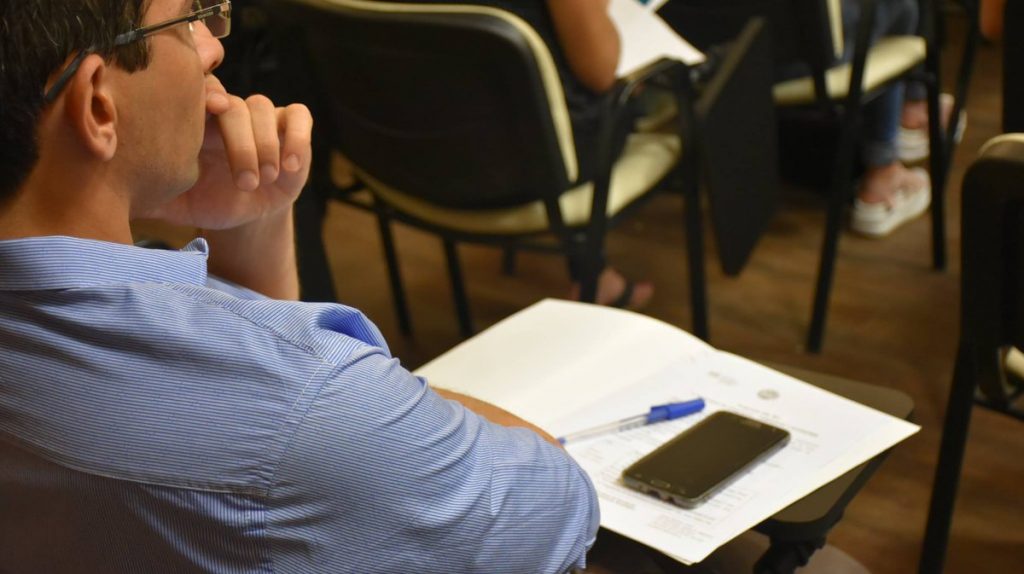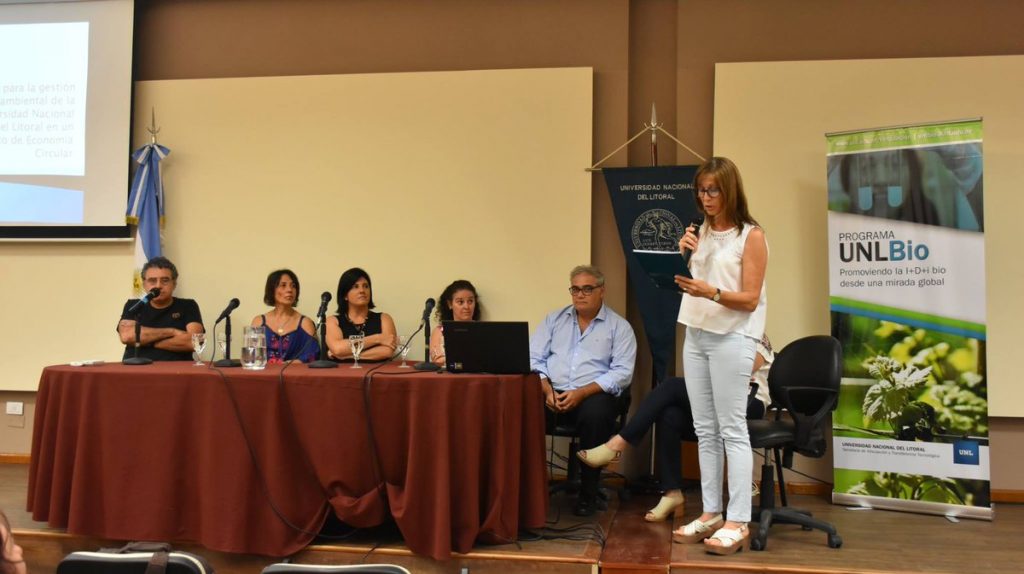The importance of collectively created knowledge for the development of projects regarding environmental, economic and social aspects, are one of the main conclusions of the Environment and Circular Economy seminar.
As a part of the UNLBio Program of Universidad Nacional del Litoral (UNL), had taken place the first Integrative Seminar “Environment and Circular Economy”. It was presented as an academic space where teachers, researchers, students and profesionals were able to share their research findings and exchange ideas about projects that are being held in the UNL.
This first encounter was on november 22nd in the Economic Sciences Faculty. The event was organised by Assistance Council of the Program and Technology Transfer Office. The presentations were grouped by theme panels such as: toxicology, microorganisms, economy, ecosistems,waste valorization and transference.
The opening act was hosted by Enrique Mammarella UNL’s headmaster; Sergio Hauque FCE’s dean and Javier Lottersberger, Technology Transfer Ssecretary. On this ocassion, Mammarella highlited UNL’s potential as a working team and quoted the current foundings call inside the institution for projects that target the circular economy área.
Finally, he explained that “the humanity problems that have emerged in the last years couldn’t be solved by one isolated discipline. This is what our university tries to fix: we want to generate knowledge spaces in order to give back all the resources that society needs”.He also added that the institution looks forward to the cration of integrative and valuable working method: “we need a more integrative visión of the work dynamic. It needs to be enriched because knowledge is built in a coordinated and colaborative way”.
Meanwhile, Lottersberger said that “University has huge potential and there is a lot of effort and work put circular economy projects, and that is, sometimes, a fact that is not of public knowledge.
On the other hand, through the Technology Transfer Office, we see the growing importance of sustainable project’s creation, to take care of the three critical points: economics visión, environmental visión and social visión. The idea of this seminar was to promote the bonding between every Faculty, Institute and Entity to generate a more dynamic interaction. After that, he claimed that UNL has applied for international callings regarding circular economics.
During the Environment and Circular Economy Seminar, 12 projects were presented by research groups from Medical Sciences, Biochemestry and Biology Sciences, Economic Sciences, Engenieering and Water Sciences, Agricultural Sciences, Chemical Engenieering, Human Sciences and Vet Sciences faculties.
Circular economy as a social responsability
Circular economy as a social responsability topic and how to integrate it to the entreprises logic and strategics was one of the issues discussed in the panels. The presentation hosted by Juan Pablo del Barco, teacher and researcher of the FCE, commented on circular economy proposing: a new way of producing and managing, in contrast to straightforward economy born in the industrial revolution. This aims to the social responsability that enterprises and all kinds of organisations have on environment..“Circular economy promotes that the companies add the environmental factor to their plans. There is a need to measure the positive and negative impacts of their production on the community, the environment and the economy” he finished.,
The impact of waste in environment
Another example of the topics treated during this seminar were related to the teamwork of Ecotoxicology Laboratory from FHUC, where collective projects between Santa Fe’s City Hall and a company that processes urban solid residues, are taking place.
In this company’s facility leachate residues are generated after several previous rubbish treatments.
The proejct aims to know the characteristics and the impact of this liquids “we have a couple of years working on them and we are making tests, in the different seasons of the year, taking in consideration environmental factors like rains, and then anaysing physical and biologic chemicals. This is a knowledge that is not social available yet”, explained Ana Maria Gagneten, person in charge of the Laboratory.
This analysis is useful to see the times of waste degradation and the impact of the overturn of leachate residues on the wáter stream. “The companies have to fulfill specific overturn criteria. The leachate in Santa Fe are overturned over the Salado river. We are also making studies on this river to know if the overturn affects the population or the wildlife in a negative way . It is an alternative for environment protection.”, she added “we are trying to generate knowledge to adress environmental aspects and mostly toprovide a foundational theorical background for future.



